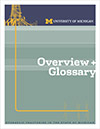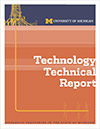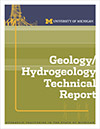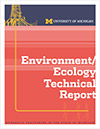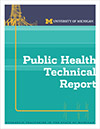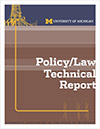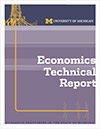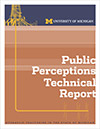![]()
Photo credit: Heather Rousseau, Circle of Blue
Project Summary
There has been significant momentum behind natural gas extraction efforts in the United States, with many states embracing it as an opportunity to create jobs and foster economic strength. Natural gas extraction has also been championed as a way to move toward energy independence and a cleaner energy supply. First demonstrated in the 1940’s, hydraulic fracturing is now the predominant method used to extract natural gas in the U.S.
As domestic natural gas production has accelerated in recent years, however, the hydraulic fracturing process has come under increased public scrutiny. Concerns include perceived lack of transparency, chemical contamination, new techniques, water availability, waste water disposal, and impacts on ecosystems, human health, and surrounding communities.
The Hydraulic Fracturing in Michigan Integrated Assessment (IA) is the result of a unique partnership involving several University of Michigan units, industry representatives, environmental organizations, and state regulators that formed in 2012 in order to examine the multiple aspects of this gas extraction technique with an emphasis on impacts and issues related to the State of Michigan.
The project was a partnership of U-M's Graham Sustainability Institute, Energy Institute, Erb Institute for Global Sustainable Enterprise, and Risk Science Center.
Key Outcomes
- Upon release, the seven technical reports (available below) together formed the most comprehensive Michigan-focused resource on hydraulic fracturing.
- Drawing upon the information provided by the technical reports, additional peer-reviewed materials, stakeholder input, and expert peer review, the final report offers an analysis of Michigan-specific policy options for high-volume hydraulic fracturing with a focus on three key issues: chemical use, water resources, and public participation.
- Praised by both state regulators and environmental organizations, the IA was also cited by Governor Snyder in a March 2015 special message for its usefulness for evaluating options for hydraulic fracturing:
Resources
Project Reports
Overview (160KB PDF)
Technology: John Wilson and Johannes Schwank (1.7MB PDF)
Geology/Hydrogeology: Brian Ellis (3MB PDF)
Environment/Ecology: Allen Burton and Knute Nadelhoffer (3.5MB PDF)
Public Health: Nil Basu (1.5MB PDF)
Policy/Law: Sara Gosman (428KB PDF)
Economics: Roland Zullo (628KB PDF)
Public Perceptions: Kim Wolske and Andrew Hoffman (528KB PDF)
Download the technical reports (10.7MB ZIP)
IA Process
An advisory committee composed of representatives from corporate, government, and non-governmental organizations provided input and advice reflecting the view of key stakeholder groups and to ensure the scope of study is relevant to decision makers. Committee members also provided data and input throughout the process, but decisions regarding content of project analyses and reports were determined by the U-M Report and Integration Teams.
- Valerie Brader – Senior Policy Advisory, Governor's Office of Strategic Policy, State of Michigan
- James Clift – Policy Director, Michigan Environmental Council
- John DeVries – Attorney, Mika Meyers Beckett & Jones; Michigan Oil and Gas Association
- Hal Fitch – Director of Oil, Gas, and Minerals, Michigan Department of Environmental Quality
- Gregory Fogle – Owner, Old Mission Energy; Michigan Oil and Gas Association
- James Goodheart – Senior Policy Advisor, Michigan Department of Environmental Quality
- Tammy Newcomb – Senior Water Policy Advisor, Michigan Department of Natural Resources
- Grenetta Thomassey – Program Director, Tip of the Mitt Watershed Council
- John Wilson – President, TMGEnergy, LLC
Stakeholder engagement was a key component of this integrated assessment (IA). The public was invited to provide input to inform the scope of the IA and comments on the draft IA report, and a webpage accepted comments throughout the entire IA project. The comments received were reviewed, organized, and shared with the researchers and Advisory Committee to aid in developing the IA plan and revising the final IA report.
In addition, a panel of subject area experts representing multiple disciplines completed a peer review of the draft IA report to evaluate the scientific credibility, rigor, and integrity of the assessment. The Final Integrated Assessment Report was prepared after careful consideration of the feedback received from the peer review panel, advisory committee, and public comments.
- March 5, 2013 – During development of the technical reports, the Graham Institute and Technical Report team members presented their report plans to decision makers and stakeholders in Lansing, Michigan. Watch the video, download the presentation (PDF), and review the event comment summary (PDF).
- September 9, 2013 – A webinar after the technical reports were released included an overview of the project and question and answer session with several technical report authors. Watch the video, download the presentation (PDF), and review the attendee question and response summary (PDF).
- February 26, 2015 – Following release of the draft IA report, Graham held a public webinar with several authors of the draft report. Watch the video, download the presentation (PDF), and review the attendee question and response summary (PDF).
Related Links
- Map of High Volume Hydraulic Fracturing: Applications & Permits in Michigan (Lower Peninsula) DEQ
- High Volume Hydraulic Fracturing Water Use Tracking - 2008 to Present DEQ, 6/2015
- Energy & Environmental Policy Initiative Fracking Project The Closeup
- Hydraulic "Fracking": Are Surface Water Impacts An Ecological Concern? Environmental Toxicology and Chemistry article, 8/2014, by project contributors Profs. Burton, Basu, Ellis, and Knadelhoffer, and others
- Clearing the Waters of the Fracking Debate Michigan Journal of Sustainability article by Assistant Professor Brian Ellis and others
- Assistant Professor Brian Ellis on the Impacts of Hydraulic Fracturing This video provides an overview of hydraulic fracturing but is not specific to practice and conditions in Michigan
- Michigan frack report explores options Great Lakes Echo article, 11/19/2015
- John Callewaert discusses the Draft Report with Dr. Kirk Heinze on Greening of the Great Lakes Radio interview & MLive article, 3/9/15
- John Callewaert discusses the Technical Report release with Dr. Kirk Heinze on Greening the Great Lakes Radio interview & MLive article, 9/20/13
For more information about the IA, please contact Maggie Allan at (734) 763-0749 or [email protected].
The University of Michigan's Graham Sustainability Institute, Energy Institute and Risk Science Center provided $338,646 of project funding in 2011.


